We have ads and affiliate links sprinkled around like dog treats at a training session. As an Amazon Associate we earn from qualifying purchases. If you click and make a purchase, we earn a few kibbles to keep this dog park of a website running. So, thanks for tossing us a bone.
Are Huskies good with small dogs? If you have a small dog and are thinking about adding a Husky to your family, it’s natural to question how these large, energetic dogs with their thick, wolf-like coats will interact with smaller breeds.
Their robust appearance might make you wonder about the nature of their companionship with petite canine friends.
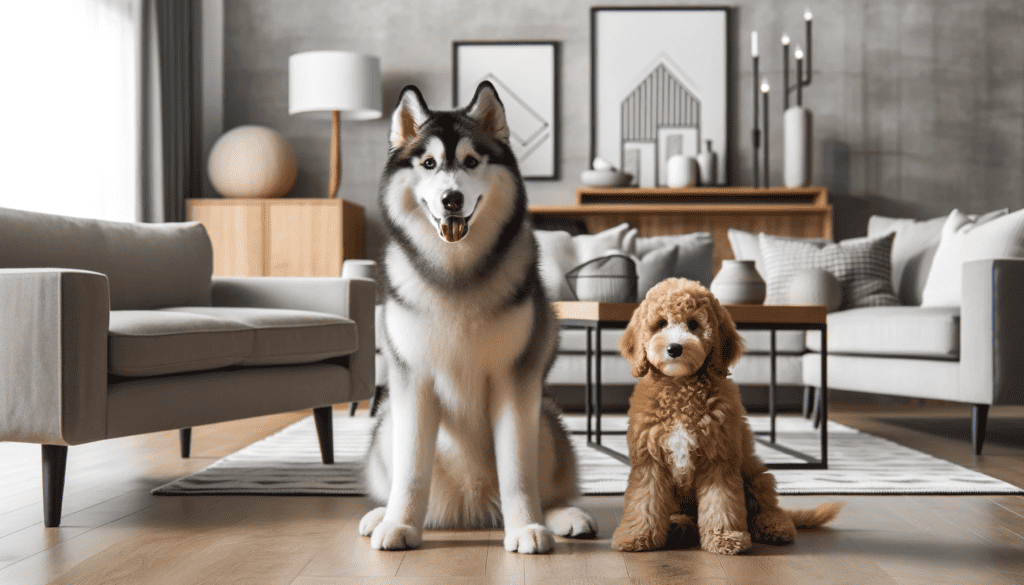
It’s true that Huskies are a pack-oriented breed, known for their friendly disposition and sociability. This often bodes well for households with multiple pets, including smaller dogs.
However, it’s important to remember that Huskies have a high prey drive. This instinct can vary from one Husky to another and will affect how they interact with smaller animals.
Providing proper introductions and training is key to promoting harmony between a Husky and a small dog. You’ll want to create a safe and controlled environment for them to get to know each other.
With the right preparation and understanding of Huskies’ behavior, you can help foster a friendly relationship, though careful supervision, especially at the beginning, is essential.
Understanding the Breed to Answer Are Huskies Good with Small Dogs
When you consider bringing a Husky into a home with small dogs, it’s vital to understand their inherent traits and behaviors.
Basic Traits
Huskies are medium to large-sized dogs known for their energy and stamina. Originating in Siberia, the Siberian Husky was bred for pulling sleds over long distances, which is why they possess such an energetic nature.
In terms of intelligence, Huskies are sharp, but their cleverness can sometimes translate to them being escape artists, finding creative ways to get out of confined spaces.
- Size: Medium to Large
- Energy Levels: Very High
- Intelligence: High, often independent-minded
Are Huskies Good with Small Dogs? Prey Drive and Instincts are Crucial to the Answer
The high prey drive is a characteristic to be mindful of, especially with small dogs around. This instinct comes from their ancestral need to fend for themselves.
Huskies often exhibit the chase behavior driven by their prey drive, which means that without proper training and socialization, they might see smaller animals as prey.
- Prey Drive: Strong
- Instincts: Predatory towards smaller animals when untrained
- Necessity: Early socialization and training to regulate instincts
Temperament and Personality
If you’re looking for a loyal and playful companion, Huskies fit the bill. They’re known for their playful attitudes and enjoy interactions with humans and other dogs.
However, they are also quite vocal, which can manifest as howling or whining. Their temperament can range from outgoing to independent, and while they may not be the most eager-to-please breed, they respond well to consistent training.
- Loyal: Yes
- Playful: Very
- Vocal: Expect various howls and noises
- Independent: Can be, needs firm training
Remember that every Husky is an individual, and while breed tendencies can provide a guideline, personal experience can vary.
Are Huskies Good with Small Dogs? How do they Interact?
When you’re thinking about how huskies interact with small dogs, it’s important to consider their strong prey drive which might influence their behavior.
Knowing how to manage these interactions and what factors play a role will help keep both your husky and the smaller dogs safe.
Potential Risks
Huskies have a high prey drive that can lead to chasing behavior, which small dogs may trigger due to their size and movements.
Although not inherently aggressive, this breed may exhibit dangerous behaviors if an encounter triggers their instinct to chase or attack.
It’s crucial to understand that even playful chases can escalate and unfortunately lead to injury or even kill a small dog if the situation isn’t well-managed.
Factors Affecting Compatibility
Several factors can influence how well your husky might get along with small dogs:
- Socialization: Early socialization with various dog sizes can decrease aggression and improve your husky’s ability to interact safely.
- Trainability: Huskies are intelligent, making them generally trainable, but they can be stubborn. Consistent training can curb their chase instinct around small dogs.
- Behavior management and control: Establishing clear behavior expectations and having strong control over your husky are key to preventing adverse incidents.
Positive Interactions
With the right training and socialization, your husky can have positive and safe interactions with small dogs. Create controlled environments for them to interact and closely monitor their behavior.
Reward your Husky for calm and gentle play, reinforcing that such interactions are both acceptable and encouraged.
Remember, individual personalities vary, and while one Husky may be great with small dogs, another might need closer supervision and more training.
Training and Socialization for Helping Huskies be Good with Small Dogs
Proper training and socialization are vital for a harmonious relationship between Huskies and small dogs. You’ll want to hone in on obedience training and ensuring your husky is comfortable on a leash around smaller pups.
Importance of Early Training
Initiating training early can set the stage for peaceful coexistence between your Husky and small dogs. Begin obedience training as soon as possible, focusing on commands like sit, stay, and come.
This builds a foundation of respect and control, which is especially important given the Husky’s high energy level.
- Commands: Sit, Stay, Come
- Purpose: Establish control and respect
- Age to start: As early as 8 weeks
Socialization Techniques
Socialization is the process of gradually introducing your husky to a variety of dogs and environments. Start this early and proceed at a comfortable pace for your dog to prevent overwhelming them.
- Leash Introductions: Use a sturdy harness and leash to introduce your husky to small dogs in controlled settings.
- Play Sessions: Arrange short, supervised play times with small, well-socialized dogs.
- Positive Reinforcement: Always reward calm and friendly behavior with treats or praise.
Behavioral Training Tips
In addition to basic commands, focus on specific behavioral training that promotes gentle play. Because huskies often don’t realize their size and strength, teach your dog to be mindful when playing with smaller companions.
- Gentle Play: Reinforce the use of soft paws and a relaxed energy when interacting.
- Mental Stimulation: Provide plenty of mental stimulation through interactive toys and puzzles to keep your husky occupied.
Remember, always keep a close eye on their body language to ensure both the husky and the small dog are comfortable and enjoying their interaction.
Husky Compatibility with Other Breeds
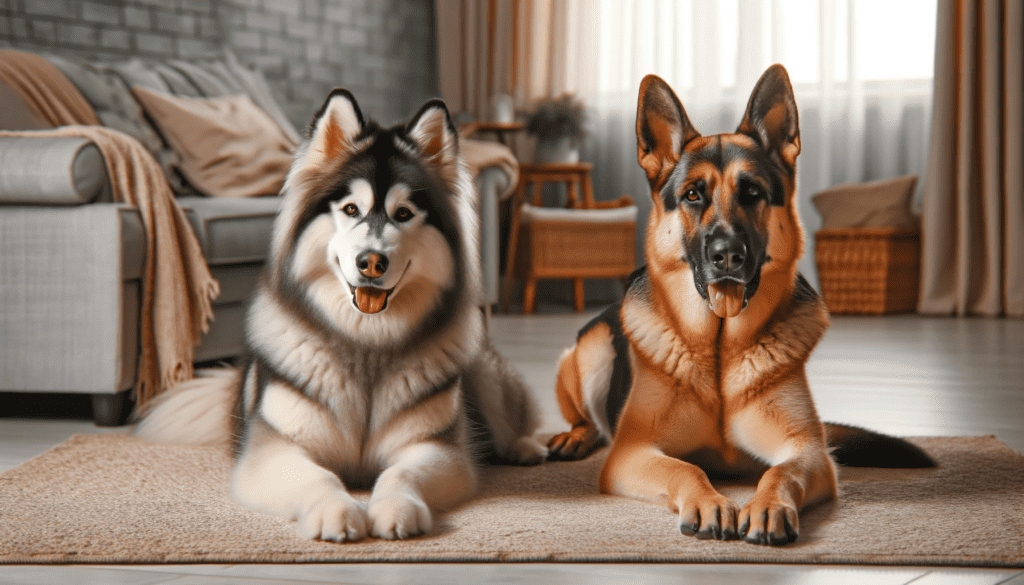
When you’re thinking of introducing a Husky to another dog, it’s important to consider compatibility. Different breeds have varying energy levels and temperaments, which can affect their interactions.
Most Compatible Breeds
- Alaskan Malamute: Similar in size and play style, they tend to match well with Huskies.
- Border Collie: Energetic and intelligent, making for a dynamic duo.
- German Shepherd: Their shared pack-oriented nature often leads to positive interactions.
- Australian Shepherd: Active and playful, they can keep up with a Husky’s energy.
- Golden Retriever: Usually friendly and tolerant, Golden Retrievers often get along with the sociable Husky.
| Breed | Compatibility Note |
|---|---|
| Alaskan Malamute | High energy, similar play styles. |
| Border Collie | Matches Husky’s energy and intelligence. |
| German Shepherd | Both are pack-oriented, likely to get along. |
| Australian Shepherd | Can keep up with Husky’s playful nature. |
| Golden Retriever | Friendly and tolerant, often compatible with Huskies. |
Least Compatible Breeds
- Dalmatian: Known for their strong-willed temperament which might clash with Huskies’ dominance.
- Pug: Smaller size and lower energy can be overwhelmed by an exuberant Husky.
- Boston Terrier: Another small breed that might be overshadowed by a Husky’s robust nature.
| Breed | Compatibility Note |
|---|---|
| Dalmatian | Strong-willed, may clash with Huskies. |
| Pug | Can be overwhelmed by Husky’s size and energy. |
| Boston Terrier | Small size and lower energy level may not be ideal with Huskies. |
Creating Positive Introductions
Introduce dogs on neutral ground to minimize territorial behavior. Understand each dog’s personality and supervise initial interactions closely. An introduction should be a controlled and positive experience for both dogs to pave the way for a good relationship.
Are Huskies Good with Small Dogs? Pros and Cons of a Husky with a Chihuahua
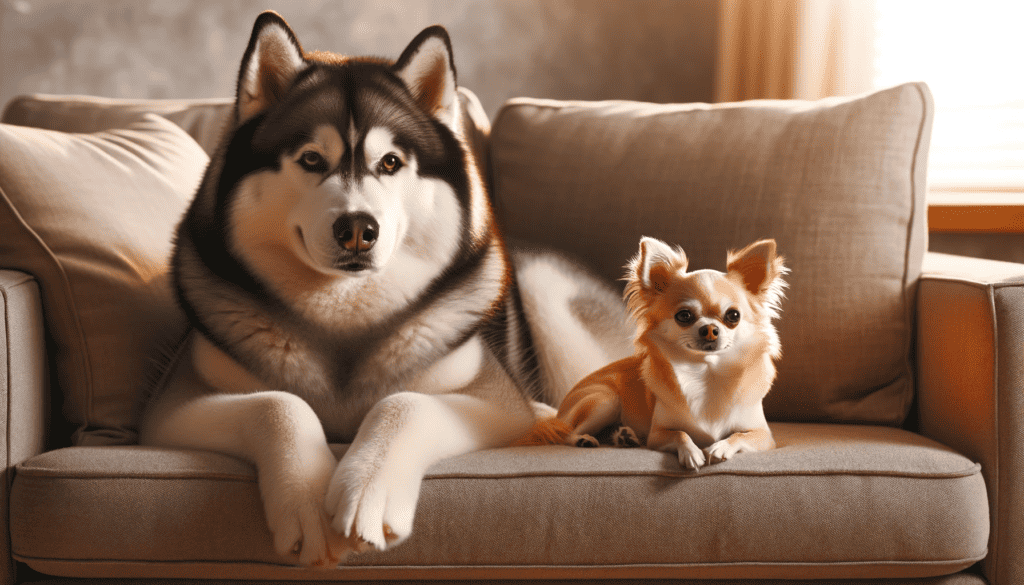
When considering whether Huskies are good with small dogs, pairing them with a Chihuahua can be a distinctive example due to the stark differences in size, temperament, and energy levels. Here are some pros and cons:
Pros of Huskies and Chihuahuas:
- Complementary Energy Levels: Huskies are known for their high energy, and while Chihuahuas can be lively, they often have bursts of energy followed by periods of rest. This can complement a Husky’s need for activity if managed properly.
- Socialization Opportunities: With proper introduction and training, Huskies can learn to be gentle and protective of smaller breeds like Chihuahuas. This socialization can lead to a strong, unlikely friendship.
- Learning and Adaptation: Both breeds can benefit from each other’s company by learning and adapting to different behaviors and signals, enhancing their social skills.
Cons of Huskies and Chihuahuas:
- Size and Play Intensity: The Husky’s large size and robust play style can be overwhelming for a small Chihuahua. Accidental injuries might occur if playtime is unsupervised or if the Husky doesn’t understand its own strength.
- Prey Drive: Huskies have a high prey drive, and without proper training, they might see a small, fast-moving Chihuahua as prey rather than a companion.
- Attention and Care Needs: Both breeds require significant attention and care, but in different ways. A Chihuahua needs gentle handling and protection from physical harm, while a Husky needs ample exercise and mental stimulation. Balancing these needs can be challenging for pet owners.
Are Huskies Good with Small Dogs? Pros and Cons of a Husky with a Pomeranian
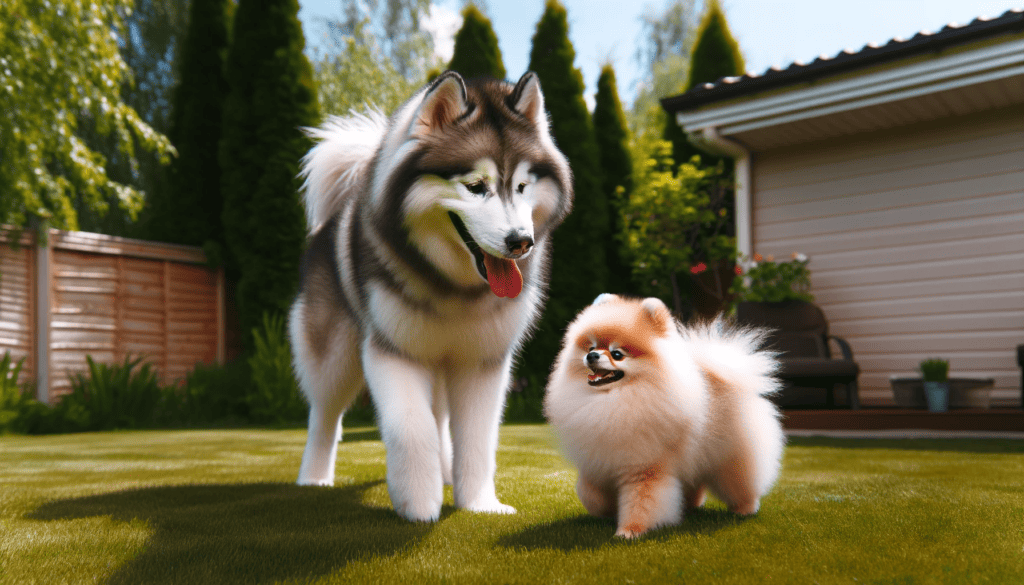
Evaluating whether Huskies are good with small dogs can be intriguing, especially when considering a pairing with a Pomeranian. These two breeds have quite different characteristics, which can lead to a variety of interactions. Here’s a breakdown of the pros and cons:
Pros of Huskies and Pomeranians:
- Companionship Diversity: Both breeds are known for being friendly and affectionate in their own ways. A well-socialized Husky and Pomeranian can provide diverse companionship to each other, offering a dynamic household environment.
- Adaptability and Learning: Pomeranians, despite their small size, are quite robust and can adapt to playing with larger dogs like Huskies, especially if they’ve been socialized from a young age. Both can learn to understand and respect each other’s boundaries.
- Exercise and Play: While their play styles differ, they can complement each other. A Pomeranian might enjoy the chase and playful antics of a Husky, providing both with mental and physical stimulation.
Cons of Huskies and Pomeranians:
- Size Disparity: The significant size difference can lead to accidental harm, especially if the Husky plays too roughly or doesn’t recognize its own strength compared to the small and delicate Pomeranian.
- Predatory Instincts: Huskies have a pronounced prey drive. A small, fluffy dog like the Pomeranian could trigger this instinct, leading to potential chasing or more severe reactions, especially if the Husky isn’t well-trained.
- Maintenance and Care: Pomeranians require regular grooming due to their thick fur, which can be quite an addition to the already demanding exercise needs of a Husky. Additionally, ensuring both breeds are mentally and physically stimulated, given their different needs, can be a challenge.
Are Huskies Good with Small Dogs? Pros and Cons of a Husky with a Dachshund

When considering the compatibility of Huskies with small dogs, the dynamic between Huskies and Dachshunds offers unique insights due to their contrasting physical attributes and personalities.
Here are the pros and cons:
Pros of Huskies and Dachshunds:
- Diverse Personalities: Dachshunds are brave and spunky, and Huskies are friendly and outgoing. If both dogs are well-socialized, they can enjoy each other’s company and provide varied interaction, keeping the household lively.
- Adaptability: With proper introduction and training, Huskies can learn to be gentle with smaller breeds like Dachshunds. Similarly, Dachshunds, known for their courageous nature, can stand their ground and engage confidently with larger dogs.
- Exercise and Engagement: While their exercise needs differ, both breeds can benefit from the stimulation of living with another dog. Dachshunds can be quite playful and may enjoy the Husky’s energy in controlled environments.
Cons of Huskies and Dachshunds:
- Size and Playfulness: The significant size difference poses a risk, especially during play. Huskies might inadvertently hurt a small Dachshund due to their larger size and energetic nature.
- Prey Drive: Huskies possess a strong prey drive that might kick in when they see a Dachshund running or playing, mistaking them for prey. This can be managed but requires diligent training and supervision.
- Back Issues in Dachshunds: Dachshunds are prone to back problems due to their long bodies and short legs. Rough play or accidental collisions with a much larger Husky could exacerbate these issues or cause injury.
Are Huskies Good with Small Dogs? Pros and Cons of a Husky with a Shih Tzu

When contemplating the compatibility of Huskies with small dogs, pairing a Husky with a Shih Tzu provides a unique set of considerations due to their differing sizes, energy levels, and temperaments.
Pros of Huskies and Shih Tzus:
- Complementary Temperaments: Huskies are generally friendly and outgoing, while Shih Tzus are known for being affectionate and friendly. If both are well-socialized, they can enjoy a harmonious relationship, with the Husky’s playful nature complementing the Shih Tzu’s loving demeanor.
- Socialization and Adaptation: Introducing a Husky to a Shih Tzu, or vice versa, at a young age can lead to a strong bond. Both breeds can adapt to each other’s presence, learning to understand and respect their differences in size and energy.
- Mutual Companionship: Despite their differences, both breeds can offer companionship to each other. A Shih Tzu can enjoy the Husky’s protective nature, while the Husky might appreciate the Shih Tzu’s willingness to engage and interact.
Cons of Huskies and Shih Tzus:
- Size and Play Intensity: The Husky’s large size and robust play style may be overwhelming for a small Shih Tzu. There’s a risk of accidental injury if the Husky is too rough or doesn’t understand its strength.
- Grooming Needs: Both breeds have significant grooming needs. Huskies shed heavily and require regular brushing, while Shih Tzus have long hair that needs frequent grooming to prevent matting. This can be time-consuming for owners.
- Prey Drive Concerns: Huskies have a pronounced prey drive, and a small, fast-moving Shih Tzu might trigger this instinct. Without proper training and control, the Husky might chase or become overly rough with the Shih Tzu.
Are Huskies Good with Small Dogs? Pros and Cons of a Husky with a French Bulldog
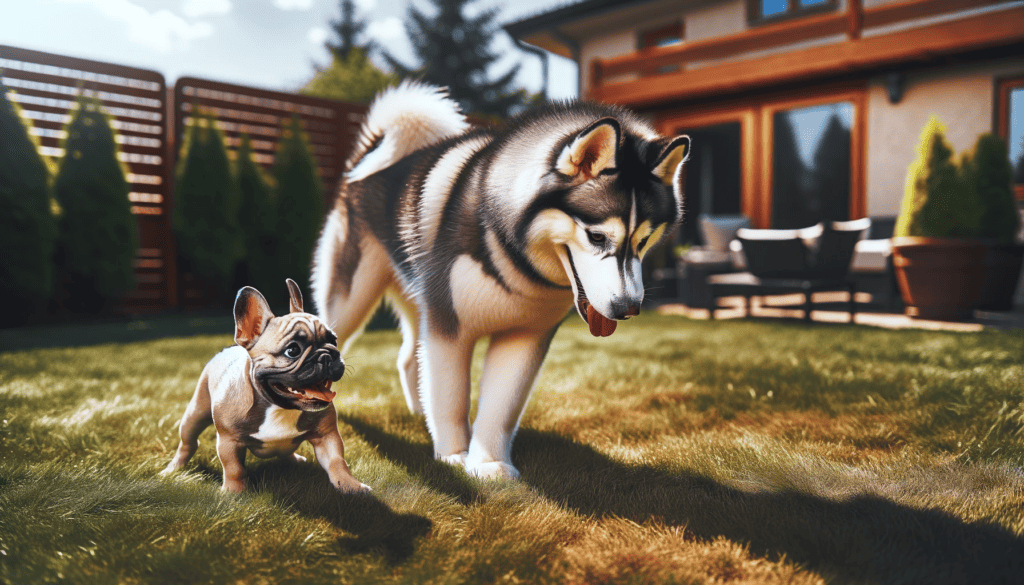
Considering the interaction between Huskies and small dogs brings us to the unique pairing of a Husky with a French Bulldog. These breeds have distinct characteristics, which can lead to various dynamics in their relationship.
Pros of Huskies and French Bulldogs:
- Personality Match: Huskies are known for their friendly nature and French Bulldogs for their laid-back attitude. If both are socialized properly, they might enjoy each other’s company, with the Husky’s energy balancing the French Bulldog’s more relaxed demeanor.
- Learning from Each Other: Both dogs can benefit from the social cues and behaviors of the other. A French Bulldog may become more active and playful, while the Husky might learn to be more gentle and calm around smaller breeds.
- Companionship: Despite their physical differences, both breeds enjoy companionship and can provide mutual social interaction, potentially forming a strong bond.
Cons of Huskies and French Bulldogs:
- Size Difference: The significant size disparity can lead to accidental injuries, especially if the Husky engages in rough play or doesn’t recognize its own strength around the smaller French Bulldog.
- Prey Drive: Huskies have a high prey drive that might be triggered by the movements of a small dog like a French Bulldog. This can lead to chasing or rough play, requiring careful management and training.
- Health and Comfort: French Bulldogs have brachycephalic faces, making them prone to breathing difficulties and overheating. The Husky’s high energy and need for activity might be too demanding for a French Bulldog, especially during play or in warmer climates.
Living with Huskies
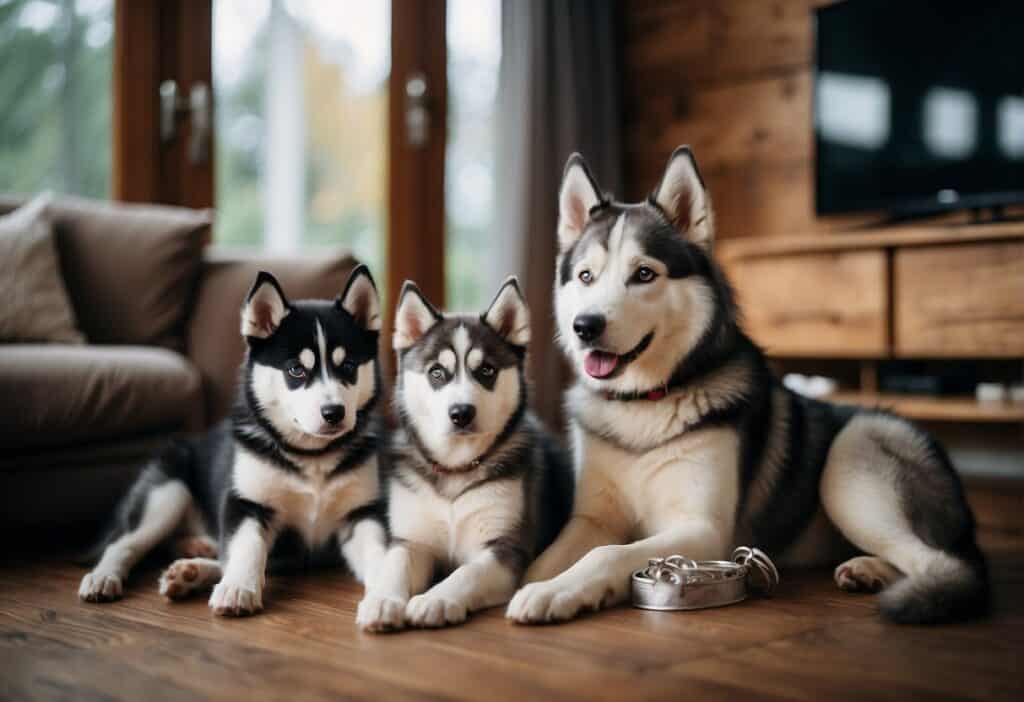
When you consider bringing a Husky into your home, it’s important to understand their energy level and need for companionship. These dogs can be great family pets but require attention to their environment and your small dogs’ safety.
Home Environment
Huskies are energetic and playful, requiring a space that allows them to expend their energy. Your backyard should be securely fenced to prevent escapes, as Huskies are known escape artists.
Inside your home, you’ll want to create a safe space for your Husky to rest and another for your small dog, especially during the initial introduction period.
Huskies as Family Pets
Huskies can be very affectionate and are generally good with kids. Their playful nature makes them a lively addition to any family. However, you need to monitor their interactions with small dogs carefully.
Huskies have a strong prey drive, which means supervision is crucial during play to ensure safety for all pets involved.
Safety and Supervision
Consistent supervision is key when Huskies interact with small dogs. It’s not just about preventing rough play; Huskies can unintentionally harm a smaller dog due to their size and strength.
Establish rules and boundaries for your Husky and use positive reinforcement to encourage good behavior. Always be present during interactions to maintain safety for your small dog.
Conclusion to Are Huskies Good with Small Dogs

You’ve seen pros and cons, sizing up the dynamic between huskies and small dogs, all while considering their pack mentality and energy levels.
Summary of Key Points of Are Huskies Good with Small Dogs
- Pros: You know Huskies can be friendly and have high energy levels making for playful interactions.
- Cons: Their dominant traits and pack animal instincts can sometimes lead to assertive behaviors.
Generally, Huskies’ larger size compared to small dogs requires close supervision, especially when they first meet. Their high energy can be overwhelming for some small dogs, but it can also turn into a fun playtime for compatible personalities.
Remember, a well-socialized Husky is more likely to be a good companion for a small dog. It’s important to allow for safe and slow introductions to ensure they can establish a respectful relationship.
